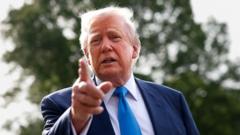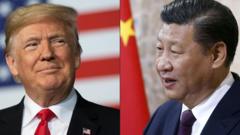**In the lead-up to Australia's federal election on May 3, the influence of US President Donald Trump looms large, complicating the political landscape as candidates grapple with international concerns amidst pressing domestic issues.**
**Trump's Shadow Casts Uncertainty Over Upcoming Australian Election**

**Trump's Shadow Casts Uncertainty Over Upcoming Australian Election**
**As Australia prepares to head to the polls, Donald Trump's unpredictable policies create apprehension among voters and politicians.**
In a vibrant scene in Western Sydney, Stetson-clad Australians enjoy the local rodeo, indulging in classic festival treats as they cheer for cowboy antics. This picturesque slice of Americana has evolved into a uniquely Australian tradition, yet as the nation approaches a federal election on May 3, it finds itself grappling with geopolitical issues, primarily the implications of President Donald Trump's second term.
The atmosphere mirrors a rodeo, bursting with unpredictable twists and turns. Australian politicians feel jarred by the recent global events surrounding Trump, particularly his volatile stance on tariffs that could disrupt long-standing alliances. Amidst the fun, audiences like Guy Algozzino express support for Trump's economic policies, declaring that tariffs could have benefited Australia long ago. "Tariffs are great," he insists, viewing Trump's leadership as a boon for American interests, if not for Australia's.
Others, however, take a more cautious, critical approach. One spectator, Jared Harris, acknowledges the tumultuous global climate while opting for a detached stance, suggesting that international politics is a show more than it is a concern. This ambivalence reflects Australia's complex relationship with the US; while geographically distanced, Australia relies heavily on its alliance, particularly in light of rising tensions with China and its expansion across the Pacific.
Prime Minister Anthony Albanese echoes this sentiment, highlighting that Trump's recent tariff decisions lack the spirit of friendship that Australians value. As the election draws closer, candidates from Albanese’s Labor Party rally around domestic issues like the cost of living and healthcare. Yet, the looming question of how to engage with Trump is unavoidable, forcing political leaders to reassess Australia's diplomatic approach.
Labor currently enjoys a polling lead, but analysts emphasize that the unpredictability of Trump's actions may be influencing local electoral dynamics. The subject of Trump's policies has permeated debates, exemplified by opposition leader Peter Dutton's efforts to position himself as a potential collaborator with the US President, a strategy that seems increasingly inadequate given prevailing public sentiments.
Voters are now more keenly aware of the implications of having an erratic ally in the White House, with a recent poll suggesting that a significant majority perceive Trump negatively. While opinions diverge on the best approach towards maintaining ties with the US, there is a consensus that cutting off communications is not feasible for a nation that feels the weight of its isolation.
As election day approaches, candidates will need to navigate this intricate web of international politics while addressing their constituents' immediate concerns. The outcome remains uncertain, but it’s clear that the decisions of the next Australian leader will be shaped by their ability to balance domestic pressures with the unpredictability of their key ally, the US.
In the crowd at the rodeo, excitement thrives. The performances continue beneath the glittering flags of various nations, including those of former allies. As Australia braces itself for the election, the question remains: can their next leader ride the political storm ahead?



















